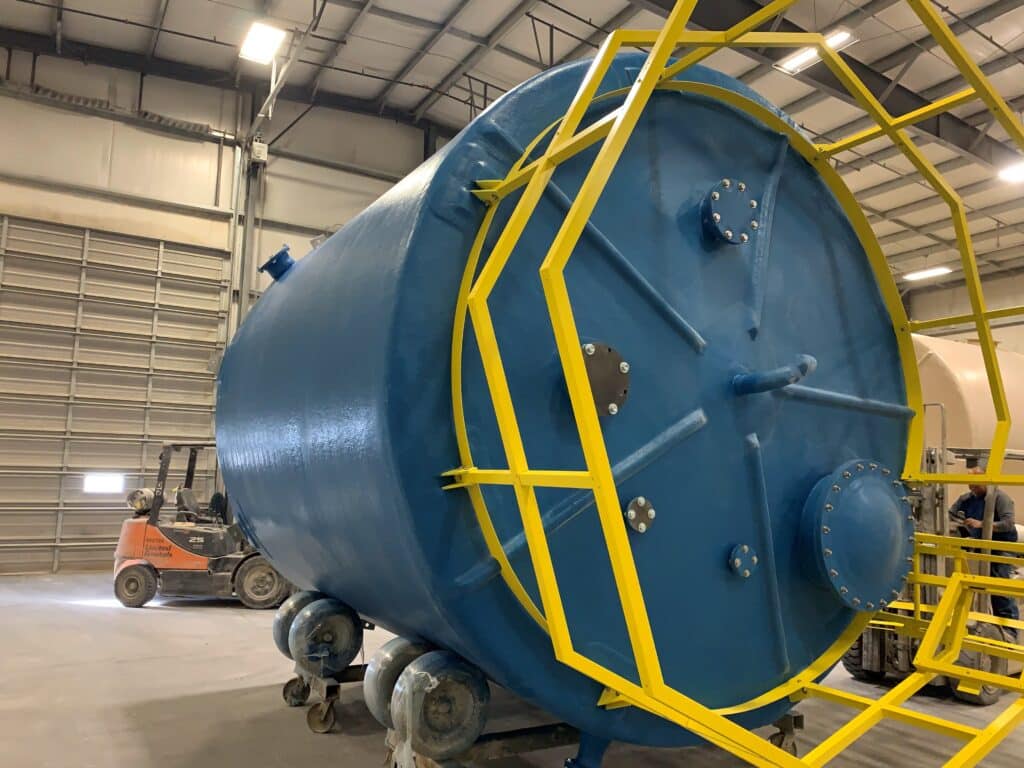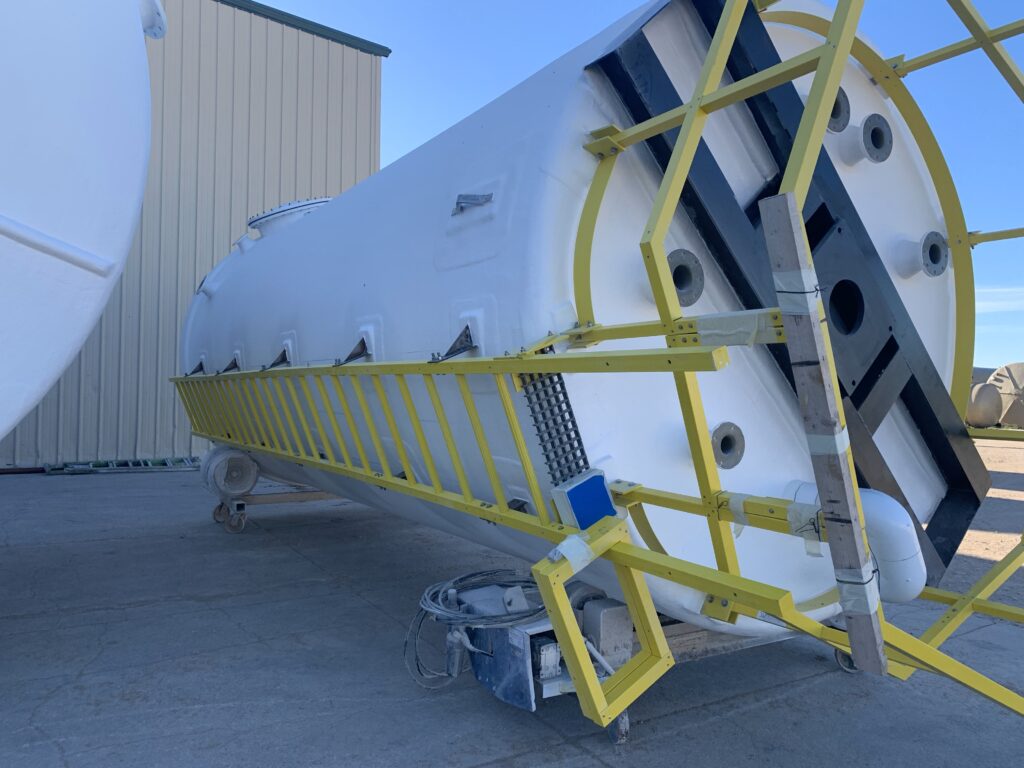- 785-372-4331
- info@kbkindustries.com
- 25025 Interstate 45, Suite 520, The Woodlands, TX 77380
KBK manufactures fiberglass, stainless steel and carbon steel tanks for
various storage and processing applications for industry.
Industrial tanks serve various purposes across different industries,
providing storage and containment solutions for industrial wastewater,
chemicals, and flammable liquids.
Each tank is engineered for corrosion and temperature properties of the product to be stored.


Here are some common applications for industrial tanks:
Industrial tanks are used for the storage of various chemicals and hazardous materials in chemical manufacturing, processing plants, and laboratories. These tanks are designed to withstand the corrosive nature of the stored substances.
In the oil and gas industry, industrial tanks are used for storing crude oil, refined products, and other petroleum-based substances. These tanks play a crucial role in the storage and distribution of oil and its by-products.
Tanks are utilized in wastewater treatment plants for the collection, settling, and processing of sewage and industrial wastewater. Different types of tanks may be used for primary settling, biological treatment, and sludge storage.
Industrial tanks are utilized in mining operations for the storage and processing of minerals and mining by-products. This may include tanks for leaching, chemical processing, and tailings storage.
In the pharmaceutical industry, tanks are used for the storage of raw materials, intermediates, and final products. These tanks may need to meet strict regulatory requirements for cleanliness and material compatibility.
Tanks are employed for storing water in industrial facilities, municipalities, and agricultural operations. They ensure a reliable and readily available water supply for different processes.
Industrial tanks store various fuels, including gasoline, diesel, aviation fuel, and biofuels. These tanks are common in industries such as transportation, power generation, and manufacturing.
Tanks are used in the food and beverage industry for the processing, mixing, and storage of ingredients and finished products. They may be designed with specific materials to meet hygiene and sanitary standards.
KBK’s tanks are used in power generation facilities for various purposes, including the storage of cooling water, fuel, and chemicals used in power plant processes.
KBK’s tanks are used to store fluid used in the cooling of data centers.
Tanks are employed for various processes in the pulp and paper industry, such as chemical storage, mixing, and pulp processing.
KBK works with your team to consider the key features needed in your tank. Industrial tank design depends on the specific application, industry, and the nature of the materials being stored. However, several common features are generally considered essential for industrial tanks to ensure their safety, functionality, and regulatory compliance. These key features include:
The choice of material for the tank construction is critical and should be based on the compatibility with the stored material. KBK manufactures tanks out of carbon steel, stainless steel and fiberglass.
The tank material and components must be compatible with the specific chemicals or substances being stored to prevent adverse reactions that could compromise the integrity of the tank.
Proper ventilation and pressure relief systems are necessary to prevent the buildup of pressure within the tank. This is crucial for maintaining safe operating conditions and preventing potential explosions. KBK offers vent valves from all major valve manufacturers.
Certain applications may require tank linings or coatings to provide an additional layer of protection against corrosion or chemical attack. The choice of lining or coating depends on the stored material. KBK employees AMPP NACE certified inspectors to insure the tank linings and coating are properly applied.
KBK offers tanks with double walls and floors to prevent accidental spills and prevent environmental contamination.
Considerations for ease of installation and maintenance should be incorporated into the tank design to reduce downtime and operational disruptions.
Tanks should be designed and constructed to resist corrosion, especially when storing corrosive chemicals or liquids. KBK offers a wide selection of materials and coatings with high corrosion resistance.
Tanks must be designed to withstand internal and external pressures, as well as seismic forces if applicable. Structural integrity is crucial to prevent leaks, ruptures, or collapses.
Tanks should be designed with manways and access ports to facilitate regular inspections, maintenance, and cleaning. These features allow for visual inspection and testing of the tank’s interior.
Tanks designed for temperature-sensitive materials may include features for temperature control, such as insulation or heating elements. This helps maintain the desired temperature within the tank.
Steel tanks may benefit from cathodic protection systems to mitigate corrosion and extend the life of the tank. KBK offers anodes to fit any application.
Tanks should be designed with environmental considerations in mind, including features to minimize emissions, prevent spills, and facilitate proper disposal or recycling at the end of the tank’s life. It is equally important to consider wind, snow and seismic factors based on where the tank will be located so each tank is properly engineered.
Tanks are highly resistant to corrosion, making them suitable for storing a wide range of chemicals and corrosive substances. This resistance extends the life of the tank and reduces maintenance costs.
KBK’s flexibility in design, enabling the construction of tanks in various sizes to meet specific project requirements. This adaptability is beneficial for customizing tanks for unique industrial applications.
KBK’s tanks are designed to be low maintenance. The resistance to corrosion and chemical attack reduces the need for frequent inspections and repairs, contributing to cost savings over the tank’s lifespan.
Tanks materials of construction are selected for resistance to a broad spectrum of chemicals. This makes them ideal for applications where the stored materials may be corrosive or reactive.
KBK’s tanks are delivered to your location to make installation easier and reduce installation time and costs.
Properly manufactured and maintained tanks can have a long service life. The material’s durability and resistance to environmental factors contribute to the longevity of the tank.
Fiberglass has low thermal conductivity, which means it is less likely to transfer heat. This can be beneficial in applications where
temperature stability is important, such as in the storage of temperature-sensitive materials.
Founded in 1975, KBK Industries is a tank manufacturing firm that helps businesses solve their storage and separation needs. KBK’s patented tank technology offers engineered solutions to businesses dealing with oily water, suspended solids or entrained gas. Our industry certifications give assurance that KBK is committed to Quality.